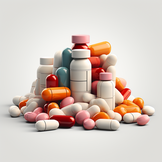Does hydrochlorothiazide cause erectile dysfunction?
- Introduction to Hydrochlorothiazide
- Exploring the Impact of Zinc Levels in Blood
- Introduction to PDE-5 Inhibitors and Sildenafil as Alternative Treatments
- The Impact of Blood Pressure Medications on Erectile Function
- Hydrochlorothiazide as a High Blood Pressure Treatment
- Understanding Erectile Dysfunction (ED)
- Identifying Other Potential Causes of ED
- The Role of Antihypertensive Treatments and Hypertension in ED
- The Role of Thiazide Diuretics in Treating Hypertension
- The Importance of Doctor Consultation when Experiencing ED on Hydrochlorothiazide
- The Link Between Hydrochlorothiazide and Erectile Dysfunction
- The Interaction Between Hydrochlorothiazide and Alpha-Blockers
- Discussing Alternative Medications and Treatments for ED
- Hydrochlorothiazide and its Correlation with Erectile Dysfunction

Introduction to Hydrochlorothiazide
Hydrochlorothiazide is a commonly prescribed medication that belongs to a group of drugs known as diuretic medications, specifically, thiazide diuretics. It functions by helping the kidneys remove excess water and salt from the body. Primarily, it's used to treat high blood pressure, reducing the overall risk of strokes, heart attacks, and kidney problems. However, like any other medication, it has potential side effects.
Exploring the Impact of Zinc Levels in Blood
Zinc is an essential mineral that plays vital roles in numerous biological processes, including enzymatic reactions, immune responses, and protein synthesis. In relation to sexual health, zinc has been associated with normal testosterone levels in men, which is crucial for maintaining sexual function and libido. Thus, it's worth exploring the impact of zinc levels in relation to erectile function and the effect of medications like hydrochlorothiazide on these levels.
Introduction to PDE-5 Inhibitors and Sildenafil as Alternative Treatments
PDE-5 inhibitors, such as sildenafil (more commonly known as Viagra), are a class of drugs widely used to manage erectile dysfunction (ED). They work by relaxing the blood vessels in the penis, enabling better blood flow and thus helping to facilitate an erection in response to sexual stimulation.
The Impact of Blood Pressure Medications on Erectile Function
Several classes of antihypertensive treatments can potentially contribute to erectile dysfunction. The physiology of an erection requires a significant amount of blood flow to the penis. High blood pressure can cause changes in the body that reduce this blood flow and make it more challenging to achieve an erection. Furthermore, specific hypertension medications, including thiazide diuretics like hydrochlorothiazide, have been linked to ED in some hypertensive men.
Hydrochlorothiazide as a High Blood Pressure Treatment
Hydrochlorothiazide, due to its potent diuretic action, has been widely used to manage high blood pressure or hypertension. By promoting the removal of excess fluid in the body, it can decrease blood volume, thereby reducing blood pressure. However, it's worth noting that while effective, hydrochlorothiazide and similar medications should be used alongside lifestyle modifications like diet and exercise for optimal management of hypertension.
Understanding Erectile Dysfunction (ED)
Erectile dysfunction (ED) is a condition characterized by the consistent inability to achieve or maintain an erection sufficient for satisfactory sexual performance. It can be caused by a variety of factors, both physical and psychological. High blood pressure, diabetes, cardiovascular disease, and certain medications can all contribute to ED.
Identifying Other Potential Causes of ED
While we are discussing the potential impact of hydrochlorothiazide on erectile function, it's important to consider that ED is often multifactorial. High cholesterol, diabetes, obesity, hormonal imbalances, certain medications, alcohol consumption, smoking, stress, and mental health disorders such as depression can all contribute to ED.
The Role of Antihypertensive Treatments and Hypertension in ED
Hypertension itself is a risk factor for ED, as it can damage the blood vessels, thereby impeding the blood flow needed for an erection. Furthermore, certain antihypertensive treatments may exacerbate the problem. Thiazide diuretics, including hydrochlorothiazide, have been associated with ED, though the exact mechanism is still not fully understood.
The Role of Thiazide Diuretics in Treating Hypertension
Thiazide diuretics are commonly used in the treatment of hypertension due to their ability to reduce blood volume by promoting sodium and water excretion in the kidneys.
This action effectively decreases blood pressure.
Hydrochlorothiazide is a representative of this class of drugs.
The Importance of Doctor Consultation when Experiencing ED on Hydrochlorothiazide
If you're a man taking hydrochlorothiazide and start experiencing ED, it's crucial to consult with your doctor before making any changes to your medication regimen. It's important to determine whether hydrochlorothiazide is the likely cause or if other factors may be contributing. Furthermore, your doctor can suggest suitable alternatives or adjustments in dosage.
To answer a common query, there isn't a 'recommended dosage of hydrochlorothiazide to avoid erectile dysfunction', as the occurrence of this side effect can vary significantly between individuals. Hence, it's crucial to take this medication as prescribed and report any adverse effects to your healthcare provider.
The Link Between Hydrochlorothiazide and Erectile Dysfunction
While not all blood pressure medications cause erectile dysfunction, hydrochlorothiazide has been reported to potentially contribute to ED in some cases. It's hypothesized that it may do so by decreasing blood flow to the penis or by altering the body's zinc levels, which can impact testosterone production. However, more research is needed to fully understand why this happens.
The Interaction Between Hydrochlorothiazide and Alpha-Blockers
Alpha-blockers are another class of blood pressure medications. They work by relaxing certain muscles and helping small blood vessels remain open. There has been a concern about the combined use of alpha-blockers and ED medications like sildenafil, as they can both lower blood pressure, potentially leading to hypotension (extremely low blood pressure).
However, in regards to hydrochlorothiazide, combining it with an alpha-blocker is usually safe, but it's essential to monitor for symptoms of low blood pressure and adjust the dosage accordingly under the guidance of a healthcare provider.
Discussing Alternative Medications and Treatments for ED
For men who experience ED while on hydrochlorothiazide, several alternative treatments can be considered. One might consider alternative medications for high blood pressure that have a lower risk of causing ED, such as ACE inhibitors or calcium channel blockers.
For ED itself, apart from PDE-5 inhibitors like sildenafil, other treatment options include lifestyle changes, psychological counseling, and even surgical procedures in severe cases. Furthermore, it's generally safe to use ED medications like sildenafil while on hydrochlorothiazide, but this should always be confirmed with your healthcare provider.
Hydrochlorothiazide and its Correlation with Erectile Dysfunction
In conclusion, while hydrochlorothiazide is an effective treatment for high blood pressure, it has been associated with the potential side effect of erectile dysfunction in some men. However, ED can be multifactorial, and it's essential to discuss these symptoms with your doctor. Importantly, if you're experiencing ED and are taking hydrochlorothiazide, do not stop taking your medication without consulting your doctor first.
There are many alternative treatments available for both high blood pressure and ED, so don't hesitate to discuss these options with your healthcare provider. In the majority of cases, ED is reversible, and it usually resolves within a few weeks to a few months after switching to a different medication or initiating ED treatment. Nonetheless, each individual's experience can be different, and personal medical history plays a crucial role in determining the best treatment path.



